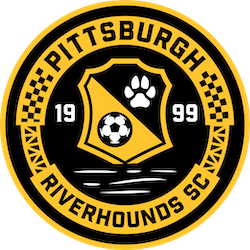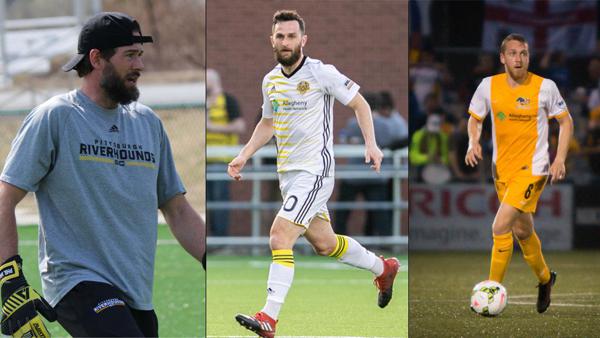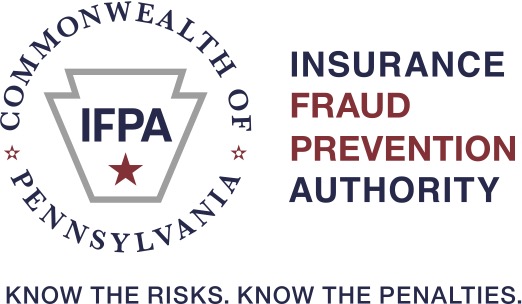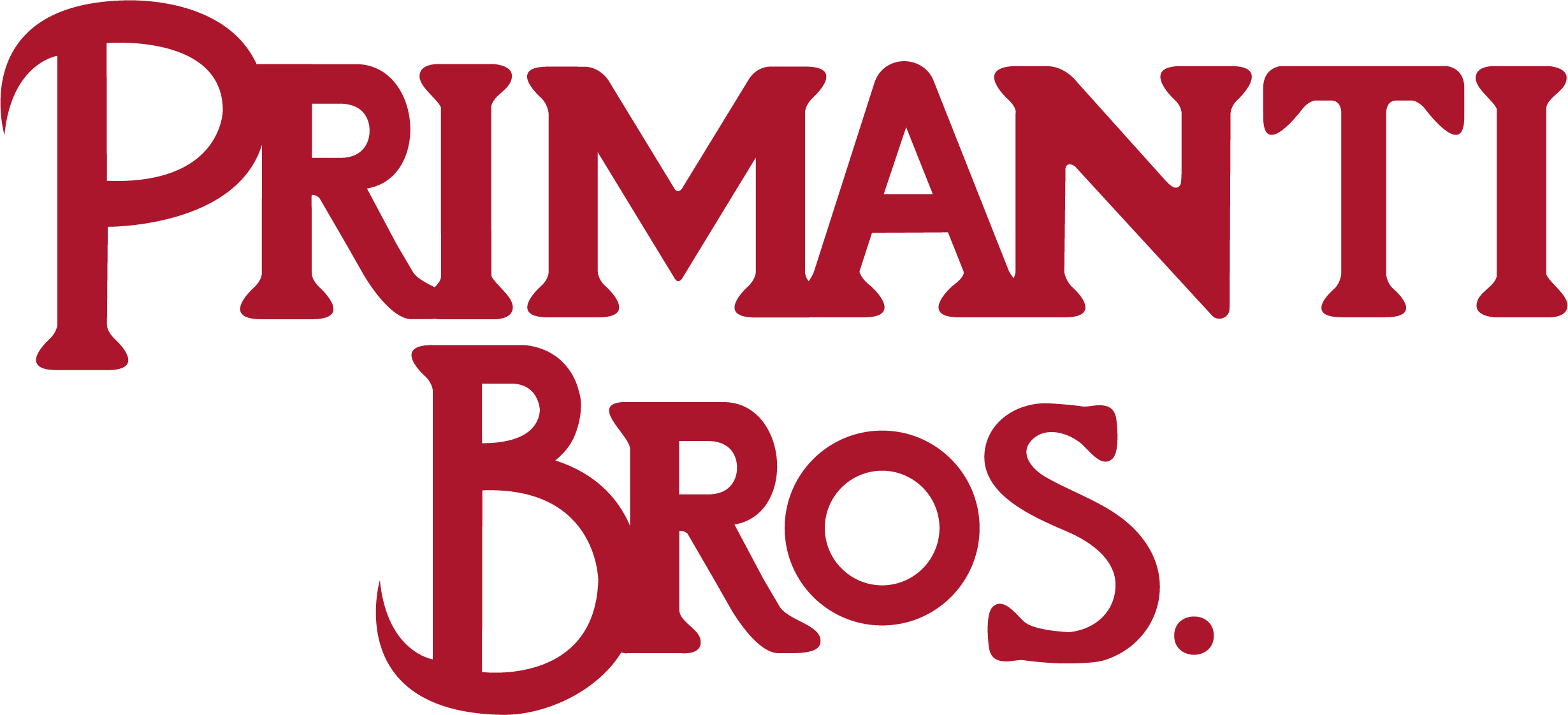Under a skyline that soars above its glittering green pitch alongside the Monongahela River, Highmark Stadium has manifested dreams for children of western Pennsylvania.
From championships and renown awards to acceptance into MLS-level youth systems, these opportunities have blossomed for youth players across the region.
At the root of this local growth, Pittsburgh Riverhounds SC has served as a catalyst to help spur this youth soccer development.
Since moving to its new home at Highmark Stadium in 2013, the club has had a goal of growing the sport of soccer even more within western Pennsylvania. One avenue the team took was to create the Riverhounds Development Academy (RDA). The Academy was initially set up to train the local youth soccer community and enhance the level of skill sets in the area.
Former and current professional players litter the ranks of the Academy’s coaching staff. Current Riverhounds midfielder and RDA coach Kevin Kerr has been involved with Pittsburgh’s youth soccer development since becoming a Hound six years ago. Kerr mentioned watching the Academy’s progression from afar but grew more involved as his tenure grew with Pittsburgh.
“I just started out doing an odd day here and helping the club out with camps and stuff,” Kerr said. “As the years have gone on, I got more and more involved with the RDA. Two years ago, I got my own [team] and I absolutely love it. We have a great group of young lads who are super invested in it. It is almost like a distraction from our game.”
This year, the RDA marks its seventh season assisting local youth players in honing their soccer skills. Starting from humble roots within the Riverhounds organization, the RDA is now one of the region’s premier development academies with club teams traveling around the country, competing in national tournaments against some of the best youth soccer players in the United States.
With the growth of the Riverhounds popularity and youth soccer as a whole in Pittsburgh, Kerr has been a firsthand witness to the expansion of the sport. He mentioned seeing a rapid rise of the game in Pittsburgh and did not see the interest stopping anytime soon.
“It is great to be a part of it,” Kerr said.
Between the Pipes
With the interest in soccer gaining traction, this opened an avenue for further development for the Academy.
Hunter Gilstrap, former Hounds player and current goalkeeper coach for the professional club, saw a hole to fill in the area’s goalkeeping skillset. The Academy and Gilstrap decided to create the Riverhounds Goalkeeper Academy to give young goalkeepers a place to hone their craft. Since its early years, Gilstrap and this program have continued to a rousing success.
“I think in between my first and second year, they said let’s do goalkeeper training and we kind of took it from there,” Gilstrap said. “We initially did training in a couple different age groups. It has grown to a pretty cool thing over the years since we added the teams into the Academy model. Prior to that, all we did was training. And now we have teams and we do training.”
The Riverhounds Goalkeeper Academy had aimed to be the area’s most thorough and intensive training regimen for goalkeepers. The training looks to improve fundamentals of setting, handling, shot-stopping, dealing with crosses, breakaways, modern distribution, organization and communication, positional play and dealing with dead-ball scenarios. Gilstrap’s intention with the Academy has been to improve the youth, whether with the Riverhounds Academy or not.
“Most of the kids in the Goalkeeping Academy are not from our Riverhounds Development Academy,” Gilstrap said. “Occasionally we will have one who wants to do extra stuff, but mostly we are servicing kids from the greater tristate area. It is a cool thing that we do, and I like when kids from other clubs come in and improve on their own clubs. My goal has always been to help goalkeepers in this area get better.”
Unfinished Business
Similar to Gilstrap, other former Hounds have come back to lend their services to the RDA.
After leaving the Hounds professional team and the youth training program in 2015, Rob Vincent took his professional career to the MLS level with D.C. United. While in the nation’s capital, he still was looking for a chance to rejoin the Riverhounds SC organization and the RDA. This opportunity presented itself in 2018, but with a new wrinkle.
During Vincent’s stint with D.C. United, the RDA joined the Elite Clubs National League (ECNL) in 2016, one of the most prestigious and competitive youth soccer leagues in the United States. The level of play within the ECNL has contributed to the standard and development to improve significantly.
“It has grown the reputation of the Academy in the area but has improved the quality of the players in the Academy,” Vincent said. “It is a lot more attractive to play in the area. Having been back around the Hounds for a year or here now. The conference we play in is very difficult now, and it is healthy competition the young players need.”
With a higher level of play available in the region, players are having more exposure to collegiate opportunities and possibly professional avenues. Overall, the soccer player in the Pittsburgh area continues to improve year after year, according to Vincent.
“I think the Riverhounds have played a big part of that, but I think nationally the sport continues to grow,” Vincent said. “Kids are getting more and more interested in it from an early age, and that is a big part of it too.”
Continued Growth
The Riverhounds name and stature as a professional soccer organization has given the Academy a step up as a recognizable brand in the Pittsburgh soccer landscape. Gilstrap said being tied to a professional club gives them the biggest opportunity for growth and success at the youth level.
The dynamic of having a professional side has challenged some within the organization who have balanced both coaching responsibilities within the Academy and obligations to the professional club. Kerr finds the commitment challenging at times but cannot stop from helping coach the younger generation of soccer.
“I do a couple of hours a week,” Kerr said. “But it is tough, I miss a lot of games because of our professional games. That has been the hardest part. Training the kids all week, and then missing their game on the weekend. So, you have to hear from a third party. There are great coaches here at the Academy. I just do my best and hope my assistants do well on the weekend.”
Gilstrap walks a wider line with coaching both for the professional club and RDA levels compared to Kerr, who is still competing on a weekly basis. He tries to coach both professionals and kids in a similar style.
“If I see stuff I think that can be improved, I will say it,” Gilstrap said. “Sometimes you have to build some trust before you say some things. With kids you can get right into them right away. That is the only main difference, in terms of technique and how I approach it, it’s similar.”
As Gilstrap, Kerr and Vincent are led by their desire to remain a part of the game, coaching provides them a unique avenue to give back to the sport they love. This is not a temporary opportunity for the trio, who plan on being a part of the youth coaching ranks for years to come.
“Yeah, I would definitely always work in football in some capacity,” Kerr said. “Especially with the kids, I would like to stay with the Academy and moving into a senior game is a tough gig. There is so much traveling involved with it. I’d love to stay in Pittsburgh and could see myself living here, helping and developing kids and players.”




























































































































































































































































































































